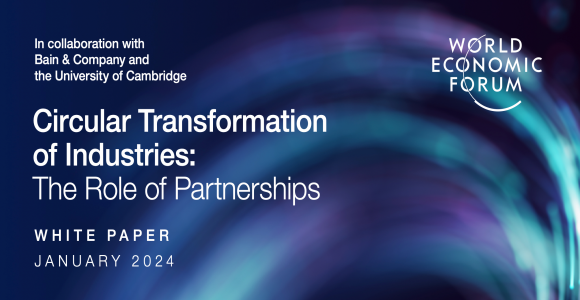IfM/World Economic Forum paper explores role of partnerships in circular transformation

Dr Jagjit Singh Srai, Director of Research in the Department of Engineering and Head of the Centre for International Manufacturing at the IfM, and Doctoral Researcher and WEF Fellow Lisa Rossi, along with members of the World Economic Forum Circular Transformation of Industries initiative, have published a new White Paper exploring the role of partnerships in circular transformation.
The paper: ‘Circular Transformation of Industries: A cross-industry, multi-stakeholder initiative at the World Economic Forum’ highlights how circular transformations are urgently needed to improve resilience, resource efficiency, environmental sustainability and unlock additional sources of revenue and growth.
Circular transformations are urgently needed in an increasingly resource-constrained world. Humanity consumes 70% more resources than the Earth’s ecosystems can regenerate, yet only 7.2% of materials that enter production processes today come from circular sources.
Circularity can help businesses increase resilience, reach new markets and customers, and deal with climate change, resource tensions, and environmental degradation.
But it is not a journey that can be taken alone.
“Solo initiatives limit companies’ ability to extract value from circular strategies,” says WEF Research Fellow Lisa Rossi, who led the research content and development of the paper.
“Partnerships play a crucial role in enabling the exchange of knowledge, information and circular materials. This promotes the development of new circular goods and services, helps establish innovative circular business models, and fosters a shared commitment towards building a sustainable circular future.”
The paper emphasises that companies that want to adopt circular economy practices may need to broaden their search beyond their value chains to acquire circular inputs or find buyers for their by-products and waste materials. They may also require the help of partners to improve their own circular capabilities, revamp production processes, or introduce new circular business models. As more and more companies embrace the circular economy, these partnerships are expected to develop into multi-stakeholder coalitions that establish new circular ecosystems.
The paper outlines three models for creating value through a circular economy and presents examples of how collaborations can significantly impact each of them. It delves into the ways these models are shaped by partnerships that aim to influence control and inflection points. It also provides five actionable steps that CEOs should consider when planning their circular strategies.
“Companies must transition to the circular economy to ensure their own survival and that of the planet. Collaboration is key to overcoming challenges,” concludes Dr Jagjit Singh Srai.
“Circularity must become the new standard to ensure the resilience of businesses, economies and the planet, and it can happen only through partnerships.”
About the paper
The paper is available to download.
The paper was published by the World Economic Forum, together with partners Bain & Company and the Institute for Manufacturing, University of Cambridge, as part of the Circular Transformation of Industries initiative. The initiative supports businesses in overcoming the challenges associated with their circular transformation.
To learn more and join the community, visit the Forum’s Circular Transformation of Industries webpage.










